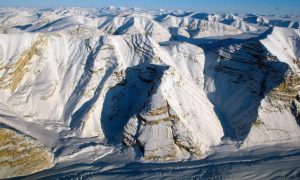
Last Fully Intact Arctic Ice Shelf Of Canada Has Collapsed Due To Rising Temperatures, 40 Percent Of Area List In 2 Days
The last fully intact ice shelf in the Canadian Arctic has collapsed, which has lost more than 40 percent of its area in just 2 days at the end of July, said researchers on Thursday.
The Milne Ice Shelf is at the fringe of Ellesmere Island, which is in the sparsely populated northern territory of Nuvanut.
The Canadian Ice Service said:
Above normal air temperatures, offshore winds and open water in front of the ice shelf are all part of the recipe for ice shelf break up. Entire cities are that size. These are big pieces of ice,” said Luke Copland, a glaciologist at the University of Ottawa who was part of the research team studying the Milne Ice Shelf.
The shelf’s area shrank by around 80 square kilometers.
It is said that the largest remaining intact ice shelf has “disintegrated”.
The Arctic has been warming at twice the global rate for the last 30 years due to a process that is known as Arctic amplification.
This year, the temperatures in the polar region have been intense.
The polar sea ice has hit its lowest extent in July in the past 40 years.
Summer in the Canadian Arctic this year in particular has been 5 degrees Celsius above the 30-year average.
The temperatures have damaged smaller ice caps, which are known to melt at a faster rate as they do not have the bulk that large or massive glaciers have in order to stay cold.
As a glacier melts down or disappears, bedrock is exposed. This then heats up and makes the process of melting faster.
After reviewing satellite imagery, researchers said:
The very small ones, we’re losing them dramatically. You feel like you’re on a sinking island chasing these features, and these are large features. It’s not as if it’s a little tiny patch of ice you find in your garden.
The ice shelf that collapsed in Canada also brought other bad news.
The shelf that collapsed on the Ellesmere Island also meant that the northern hemisphere’s last known epishelf lake is now gone.